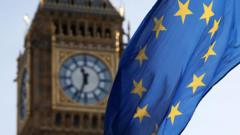As London gears up for the first UK-EU summit since Brexit, anticipation builds despite lingering complexities in negotiations. Both sides acknowledge the importance of collaboration in light of geopolitical events, including tensions with Russia and shifting dynamics with the US. European leaders, especially France, are seeking to navigate their interests while fostering closer ties with the UK.
**UK and EU on the Cusp of a New Era: First Post-Brexit Summit Approaches**

**UK and EU on the Cusp of a New Era: First Post-Brexit Summit Approaches**
The upcoming UK-EU summit marks a significant step in post-Brexit relations, amid pressing global challenges.
The summit, set for Monday, promises to address shared concerns in foreign policy, security, and trade amidst ongoing negotiations. While some may hope for ambitious agreements, the realities of political pressures in both the UK and the EU may temper expectations.
As part of the summit, a joint declaration is expected that emphasizes cooperation on Russia and Ukraine, a defense pact aimed at bolstering joint security efforts, and potential measures to lessen the trade barriers that emerged from Brexit. UK Prime Minister Sir Keir Starmer has promised to restore relations with the EU, although the anticipated agreements may not significantly alter the economic landscape due to existing constraints against rejoining the EU's customs union or single market.
Trade negotiations will focus on several areas, including a plant and animal health agreement to facilitate export and import processes between the UK and EU. While the UK seeks more favorable trading conditions, especially in agriculture, resistance from France regarding fishing rights has posed challenges. Furthermore, negotiations around a new youth mobility scheme and potential agreements on chemicals and pharmaceuticals reflect broader ambitions for cooperation—though the EU remains cautious about setting precedents for non-member states.
The defense sector also takes center stage, with the UK advocating for access to lucrative EU defense contracts that would enable its companies to participate in new European rearmament initiatives. However, disagreements persist, particularly around France's insistence on prioritizing EU firms over non-EU suppliers in defense procurement. This tension underscores the complexities involved in reconciling each member state's aspirations with the collective goals of the bloc.
As leaders gather in London, both the UK and EU appear motivated to strengthen their relationship in response to external pressures. However, significant hurdles remain, and the upcoming discussions are likely to reflect this intricate balance between cooperation and national interests.
As part of the summit, a joint declaration is expected that emphasizes cooperation on Russia and Ukraine, a defense pact aimed at bolstering joint security efforts, and potential measures to lessen the trade barriers that emerged from Brexit. UK Prime Minister Sir Keir Starmer has promised to restore relations with the EU, although the anticipated agreements may not significantly alter the economic landscape due to existing constraints against rejoining the EU's customs union or single market.
Trade negotiations will focus on several areas, including a plant and animal health agreement to facilitate export and import processes between the UK and EU. While the UK seeks more favorable trading conditions, especially in agriculture, resistance from France regarding fishing rights has posed challenges. Furthermore, negotiations around a new youth mobility scheme and potential agreements on chemicals and pharmaceuticals reflect broader ambitions for cooperation—though the EU remains cautious about setting precedents for non-member states.
The defense sector also takes center stage, with the UK advocating for access to lucrative EU defense contracts that would enable its companies to participate in new European rearmament initiatives. However, disagreements persist, particularly around France's insistence on prioritizing EU firms over non-EU suppliers in defense procurement. This tension underscores the complexities involved in reconciling each member state's aspirations with the collective goals of the bloc.
As leaders gather in London, both the UK and EU appear motivated to strengthen their relationship in response to external pressures. However, significant hurdles remain, and the upcoming discussions are likely to reflect this intricate balance between cooperation and national interests.



















